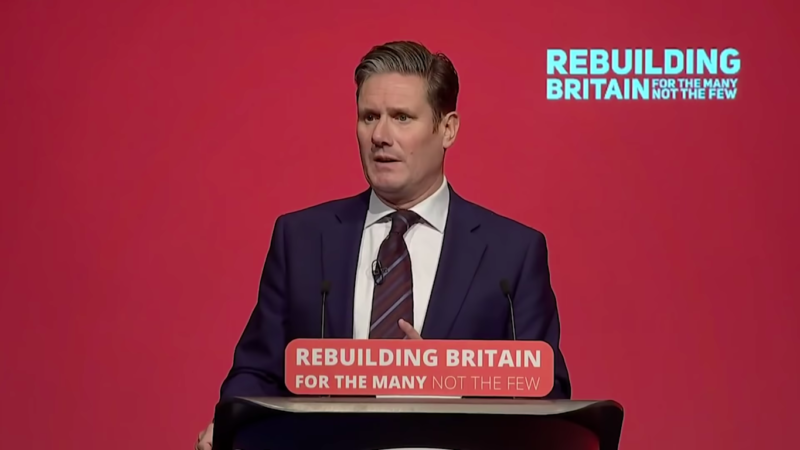
The Brexit impasse is not a crisis of Labour’s making and it cannot be solved by Labour on its own. But it can’t be solved without Labour either. It is now clear that the support of the opposition frontbench is essential for any Brexit-related measure to pass the Commons. The government defeat on Tuesday, which was effectively against no deal Brexit, was proof of that.
But the Labour leadership is boxed-in. Given its current policy commitments, the party can only vote ‘against’, not ‘for’ the various proposals for resolving Brexit. After Theresa May’s deal is voted down next week, Labour’s position must therefore change. In this moment of national crisis, the party has a responsibility not just to oppose but to offer a constructive path forward.
A preferred route will be needed if there is to be a general election, which Jeremy Corbyn will again call for today. Otherwise what would Labour campaign on? But it is even more necessary in the likely event that a vote of no confidence fails, when Labour will need a new position within hours or days.
On the Saturday after the vote, leading Labour figures will have the chance to set out their stall. Keir Starmer, Emily Thornberry and Tom Watson will all address the FEPS-Fabian new year conference. It is their chance to explain where the party goes next.
For almost two years, Labour has been well served by its six Brexit tests. They were deliberately designed to be impossible to meet and have provided Labour with the grounds to oppose every version of Brexit the government has considered. But they have also permitted Labour to avoid confronting the trade-offs the party would need to make if it was in power – or the realities of the EU’s red-lines.
So next week, to help resolve the crisis, Labour must move on from its six tests. Many in the movement would like that to mean a call for a second referendum. But Europhiles like me have to recognise that right now there is no consensus in parliament or the country to revisit the 2016 Brexit verdict. Even if the Labour frontbench unequivocally supported a second referendum, there are not the votes in the House of Commons for the proposal to pass.
Instead Labour must set out clearly and specifically what version of Brexit it will support. I am a passionate pro-European and calling for Labour to back a pathway to Brexit leaves a bitter taste in my mouth, but it is the only way of breaking the deadlock.
The party needs to present a real-world Brexit plan, which the frontbench is ready to vote for. This is a huge opportunity for Jeremy Corbyn to exercise national leadership and it is something he hinted at in his September party conference speech. Then he said to the prime minister “if you deliver a deal that includes a customs union and no hard border in Ireland, if you protect jobs, people’s rights at work and environmental and consumer standards – then we will support that sensible deal”.
Labour can’t wait any longer for May to make a move. It should set out its own plan and get on the front foot. After all, Jeremy Corbyn and John McDonnell will not want to fall in behind a cross-party compromise instigated by MPs on their own backbenches or from within a Conservative cabinet.
We know the outlines of the Brexit that Labour can support. Any viable, jobs-friendly plan must include some form of customs union and single market membership. It is true that an EEA-style relationship is far from perfect for Britain. But we’ve reached the point where Labour needs to stop pretending that it can have everything it wants.
What’s more, the country can always accept EEA terms for now and test their boundaries once they are in place, whether that is with respect to the regulation of free movement of people or ‘Lexiteer’ concerns regarding economic intervention. If a Norwegian- or Swiss-style relationship really doesn’t work, further divergence could always be negotiated in a decade’s time. But so could rejoining the EU.
After the vote next week, Labour must also specify what procedural steps it will support to resolve the crisis. Given where we are, it is unrealistic but also unnecessary to abandon May’s withdrawal agreement. The reason Labour cannot support it at present is because it paves the way for a blind Brexit, which could lead to a severing of all ties with Europe.
Labour should demand political and legal safeguards that lock-in its preferred version of soft Brexit. This could take the shape of a revised political declaration with the EU and also new domestic legislation. With both in place, Labour would be in the driving seat and could approve the May withdrawal agreement, since it is only a transitional deal.
I still hope Brexit will fail. But the only way this will happen is if Labour sincerely presses for a soft Brexit first and it then proves impossible. That scenario is easy to imagine. If Labour comes forward with credible proposals for soft Brexit, they could easily be rejected by the government or voted down in the Commons.
If that happened, it would finally be clear that no parliamentary path forward exists. With all other avenues exhausted, Labour could swing its weight behind a second referendum, united as a party. Only then could Labour explain to Leave voters why another vote was needed – and only then could Labour fight and win a united campaign for Remain.
Andrew Harrop is general secretary of the Fabian Society.




More from LabourList
‘Labour won’t stop the far right by changing leaders — only by proving what the left can deliver’
‘Cutting Welsh university funding would be economic vandalism, not reform’
Sadiq Khan signals he will stand for a fourth term as London Mayor